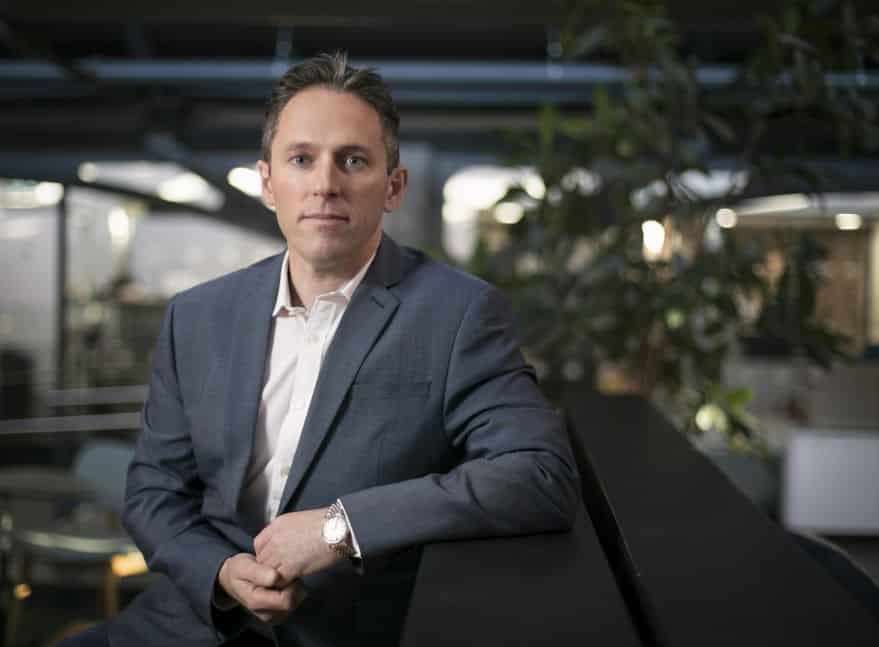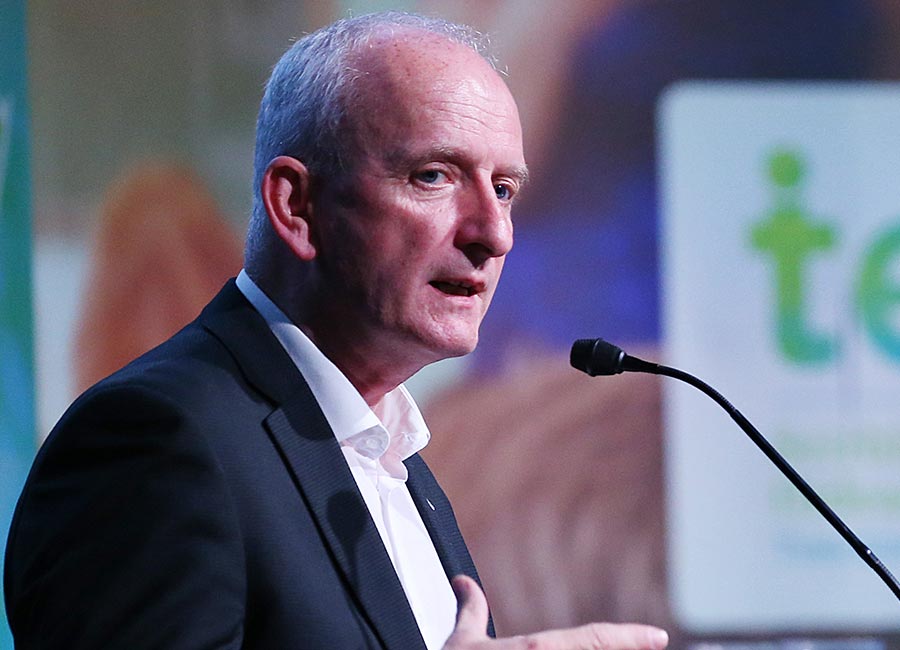Hospital consultant Martin Rochford gave up his job as a doctor to start medical invoicing company MedoSync. He talks to John Kinsella about an entrepreneurial itch he just had to scratch
Very few hospital consultants jump out from their full-time day job to start a business. Martin Rochford, an expert in emergency medicine, hasn’t completely abandoned his profession but most of his focus now is on making a success of MedoSync, which he established in 2019 with co-founder Seamus Cooley, the tech brain behind the venture.
MedoSync has developed a platform that integrates hospital and insurer systems so as to enable accurate, efficient and real-time medical billing. The solution has been adopted by the Bon Secours hospital group and in Affidea and Laya clinics, and was used to submit c.50,000 claims in 2021.
The venture was initially funded by the founders and Rochford’s family, and last year the hat was passed around for more seed capital. The company secured €850,000, so now there’s no going back for Rochford and Cooley, even if the pace of progress doesn’t quite match their expectations.
Rochford says that founding MedoSync scratched an entrepreneurial itch that stayed with him throughout his medical career. Like his consultant peers, Rochford put in the hard yards to progress in the profession.
He spent five years in Australia completing his training programme in emergency medicine before returning to Ireland in 2009 to take up a casualty department role at Tallaght Hospital, where he headed the unit from 2014 to 2016.
The problem with the entrepreneurial itch is that it’s not simple to find a business idea that is worthwhile in terms of the probable rewards relative to the risk and hard graft required in establishing a business.
“I had lots of ideas but I was always aware that the problem is the most important thing,” says Rochford. “You need to find a problem that everyone cares about. If nobody wants to pay to solve that problem, then it's not much of a business idea. In my case, the problem was right under my nose.”
As Rochford tells it, medical billing is a massive challenge for finance teams in hospitals. There are thousands of procedures and hundreds of health plans, and when the bill for payment is sent to the health insurer, if the coding or patient detail isn’t correct then the insurer will stall the money transfer.
Incorrect detail can also lead to a lower payment than anticipated from the insurer, and Rochford estimates that muddled billing results in 6-9% leakage of revenue for hospitals.
Rochford explains: “As complexity in the care of patients increases, so does managing the healthcare billing that pays for this treatment. Patients appear multiple times for varying treatments and from different doctors. The existing systems can’t cope with the sheer volume of information captured about a patient that are required for easy billing.
“Insurers are grappling with the changing landscape of healthcare as much as hospitals. A lack of trust in the current system stemming from inaccuracies that lead to over or undercharging means that insurers have to devote huge resources to be sure that they are paying the correct amounts for their members’ care. This has created additional requirements for hospitals, and each insurer has made its own bespoke demands on providers.”
MedoSync aims to ameliorate or eliminate billing errors by loading all the treatment and health plan codes in the backend of its platform, and then have doctors, consultants and other treatment providers log on to MedoSync and input the required detail.
The patient journey through the facility, and the charges, are logged every step of the way, resulting in a complete billing picture for whoever issues the invoice to the insurer.
In time, this information could be useful for patients too. “When you ask some people what op they had a year ago and who treated them, the usual reply is 'ask my wife',” Rochford remarks.
Rochford’s idea would have been stillborn without Seamus Cooley agreeing to take the risk too. The company’s chief technology officer has a background working in Ingersoll Rand, Microsoft, Facebook and LinkedIn. However, before Cooley would write the computer code for the MedoSync database, first he and Rochford had to listen.
“At the start we spent a lot of time with the billers understanding what the problems are,” says Rochford. “We were aware that if you don't understand the problem you certainly can't fix it.”
Seed funding
Initial funding of €100,000 was sourced in 2020 from Louise Cox, Martin Rochford’s wife, and Brendan Rochford, his brother, and MedoSync accounts for that year disclose start-up losses totalling €114,000. “Louise told me just go for it,” Rochford recalls. “If you want to do it, let’s not talk about it - just do it.”
Cooley had the MedoSync product ready to go in early 2021 and the first adopter was Richard Egan’s MyMedical, which operates three urgent care centres for Laya Healthcare.
Egan was so impressed that he invested €50,000 in Rochford’s venture, and as well as running MyMedical is now MedoSync’s chief operating officer.
The company raised €140,000 in equity funding in March 2021, and in August 2021 tapped ten investors for €575,000. They included Jim Hannon and Alan Coleman who had great success with Britebill, and Michael Harding, who has experience of insurance technology platforms.
According to Rochford: “We were very clear about the type of investor we spoke to. We wanted people who could help and advise us. We didn't really go out and look for money as such. It just happened through personal introductions.”

As well as bringing Richard Egan on board as COO, earlier this year MedoSync hired Ivan Eustace for the role of customer success director. Eustace formerly worked in ad agencies Dentsu and Core, and he is tasked with ensuring that MedoSync adopters get the most from the technology.
Says Rochford: “When we were looking for funding, we asked ourselves what do we really need to make this venture successful? We required someone with a good business pedigree who understands billing and how to run a business.
“Communication is unbelievably important. You can have the greatest product ever, but it’s no good if nobody can use it. You need someone who is really good at making sure that there is excellent customer experience.”
Three years into the MedoSync journey, Rochford recently reflected that though the external perception of a start-up is that progress is fast-paced, the reality is that success is more of a compounding formula.
“The importance of momentum can’t be understated, and when the momentum slows it can be turgid and deflating,” Rochford wrote on the company blog.
“It is during the slow periods that I start shovelling coal and start to get things moving. Even a positive meeting with a potential collaborator can have a galvanising effect. This is an important lesson for me and the people I work with – seeking out small wins as they are greater than the sum of their parts.”
In conversation, Rochford makes the point that when things are not going well, entrepreneurs require drive just to get out of bed in the morning and go to the office.
“There are bad days when you feel that things are not moving as fast as you'd like. When you don’t know what to do next, just meet someone and ask for advice. From my medical experience, I learned a long time ago that usually someone else knows the answer.”
MedoSync is fully integrated with Ireland’s three private health insurers, and the arrangement with the Bons Secours should help build up product trust with other private hospital operators. The product has export potential to the UK and Australia, though each market has its unique billing issues.
MedoSync was recently accepted onto the GKV:impulse Accelerator, a German programme seeking digital solutions for processing payments more efficiently.
It’s hosted by Bitmark, an IT and managed services provider that works with 80% of Germany’s statutory health insurers.
“We are delighted to join this prestigious Accelerator, and to be the sole Irish representative competing with eight others around Europe," says Rochford. "We look forward to having the opportunity to pitch our solution to some of Germany’s largest healthcare providers.
“In terms of momentum it has been great this year. Starting a business was something I always wanted to do and I have no regrets. I think that anyone who has that urge should go and do it, because life is short. You need to do what you like doing as opposed to what people want you to do.”
Photo: Martin Rochford, founder of MedoSync. (Pic: Chris Bellew/Fennell Photography)











